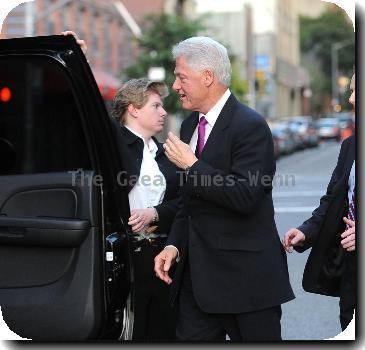New Yorker Lori Berenson freed after 15 years in Peruvian prison for aiding leftist rebels
By Rick Vecchio, APFriday, May 28, 2010
NY woman who aided Peru rebels free after 15 years
LIMA, Peru — New Yorker Lori Berenson walked out of a Peruvian prison with a smile on her face Thursday, then pushed through a mob of reporters before settling into a neighborhood that met her with hostility.
“Go away, terrorist!” one of her new neighbors shouted.
Now 40, she looked smaller, more austere than the strident young activist who nearly 15 years ago shouted that the leftist rebels she was accused of aiding were not terrorists but revolutionaries.
She now has a young son and a bad back; her once-flailing hair is now tamed in a long braid.
At least one thing hasn’t changed: She has never denounced the Tupac Amaru Revolutionary Movement she was convicted of abetting.
When she was arrested in November 1995 with the wife of the group’s leader, prosecutors said Berenson was helping plot a takeover of Peru’s Congress. The alleged plot was thwarted when in a gun battle at a rebel hideout that Berenson was convicted of having rented. In the house, the police found a forged ID card bearing her photo.
Berenson was convicted of treason by a military court in 1996 and sentenced to life in prison. But after an intense campaign by her college professor parents and pressure from the U.S. government, she was retried in a civilian court. In 2001, it convicted her of the lesser crime of terrorist collaboration and sentenced her to 20 years.
A judge granted her parole Tuesday, noting defense documents that said Berenson had “recognized she committed errors” getting involved with the rebels.
Many Peruvians expressed displeasure, even anger, at Berenson’s release.
“Go away, terrorist!” shouted 42-year-old Carol Philips as Berenson and Anibal Apari, her lawyer and husband, pushed their way through journalists to get into the apartment building in the upscale Miraflores neighborhood where she is to live.
“I think terrorists like Lori don’t repent in this country,” said Maria Castillo, 39, and the wife of a police officer. “The terrorism prisoners never change because they are jailed for their ideals.”
The Miraflores district mayor, Manuel Macias, told reporters Berenson should find a home elsewhere: “The way out of this perhaps is for her expulsion from the country.”
That could happen.
The judge who paroled Berenson said she must stay in Lima until her sentence ends in November 2015. But Peru’s Cabinet chief, Javier Velasquez, said the ministers would meet to decide whether to commute the sentence and expel Berenson. It was not known when the Cabinet might meet.
Berenson’s release Thursday from Santa Monica women’s prison was a tempest in itself. She squeezed through a horde of reporters into a car that her husband and attorney, Anibal Apari, drove to the Miraflores apartment. Two Peruvian reporters jumped into the car, which had a minor collision a block away with a TV channel’s vehicle.
Outside the apartment, Berenson appeared calm, almost bemused, as she sat for some five minutes in Apari’s car, surrounded by journalists. She wore dangling bead earrings, a khaki green button-down shirt with the sleeves rolled up and carried a black bag with blue straps.
She did not speak to reporters. She said in her parole request that she planned to work as a translator and a dessert chef.
Lori Berenson’s son, Salvador, has been living with his mother since his birth a year ago. He was taken to the fifth-floor apartment separately by her parents, Mark and Rhoda Berenson, who flew in from New York City on Wednesday.
The couple who told The Associated Press they came not just for the joy of their daughter’s release but also to help childproof the apartment.
Mark Berenson said he was looking forward to frolicking with his only grandchild, and was excited to introduce his daughter to the Internet: “Can you imagine not having seen virtual reality?” he said.
Lori Berenson dropped out of the Massachussetts Institute of Technology in 1989 to pursue a passion for social justice. After a time in Central America — she worked as confidential secretary to El Salvador’s top rebel commander during peace negotiations there — she traveled to Peru in 1994.
After her arrest, Berenson was initially accused of being a leader of the MRTA, which bombed banks and kidnapped and killed civilians but was nowhere near as violent as the better-known Shining Path insurgency.
She has long maintained she was a political prisoner. At a public appearance after her arrest she shouted to reporters: “There are no criminal terrorists in the MRTA. It is a revolutionary movement.”
A year after her arrest, the Tupac Amaru gained notoriety when 13 of its members stormed the Japanese ambassador’s residence and seized hostages. Among their demands was Berenson’s release. The standoff ended 126 days later with all the rebels killed.
Senior MRTA leaders remain in prison with life sentences though many others have been paroled.
Berenson has now apparently softened, the years in captivity, many in frigid, windowless prisons on the high Andean plateau taking their toll. The judge who paroled Berenson said she had “completed re-education, rehabilitation and re-socialization” and demonstrated “positive behavior.”
After the parole hearing, Apari was asked by a radio reporter whether Berenson was repentant; he did not answer. A former Tupac Amaru member who was paroled in 2003 after serving 13 years in prison, Apari also was asked whether he himself was repentant. He would only say, “I assume responsibility.”
Berenson’s parents said their daughter and Apari would be legally separating and that Lori would alone raise Salvador, who was born in May 2009 by cesarean section.
Mark Berenson told the AP before his daughter’s release that he was anxious about her health, particularly her degenerative back ailment, for which she underwent a seven-hour surgery in November.
He attributed her bad back to lifting 20-kilogram (44-pound) sacks of flour in the bakery she ran while at Huacariz prison, 850 kilometers (530 miles) northeast of Peru’s capital, Lima.
“Her health is not good,” Mark Berenson said. “All the pains came back and the surgeon saw her two weeks ago and he’s very unhappy. He wants her to go through a million more tests because they’re worried about potential nerve damage,” he added. “You see her and her posture is twisted.”
A decade ago, Lori’s parents, both Ph.Ds, took early retirement to campaign for her freedom.
Her treatment before the retrial strained relations between the administration of U.S. President Bill Clinton and that of former Peruvian strongman Alberto Fujimori, though Washington’s ambassador at the time, Dennis Jett, made it clear he believed she was guilty.
Fujimori stepped down in disgrace in 2000 before Berenson’s retrial, and is now an inmate in state custody on convictions for crimes including murder, kidnapping and corruption.
Associated Press Writers Franklin Briceno and Carla Salazar contributed to this report.
Tags: Bill Clinton, Latin America And Caribbean, Lima, Peru, South America, Terrorism


